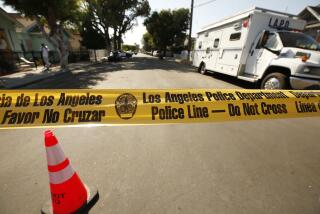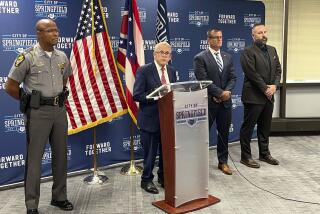Big Response to Hoaxes Is Norm in ‘New World’
- Share via
Time was in America that a bit of spilled powder called for a wet rag, not a bioterrorism alert. An unattended bag at the airport was an invitation to thieves, not cause to evacuate the terminal.
But this is a different America. So when two rambling notes found on a cruise ship bound for Hawaii threatened to “kill all Americanos abord,” Royal Caribbean’s Legend of the Seas was diverted and about 120 law enforcement officers swarmed its decks and questioned more than 2,300 passengers and crew.
The fact that the alleged note writer turned out to be a 20-year-old Laguna Hills woman apparently motivated by personal problems doesn’t surprise homeland security experts. Massive responses to threats that turn out to be hoaxes will continue to be the norm because of the attacks of September 2001, they say.
“I don’t know if I would divert a ship over a couple of notes,” said Leonard Cole, who teaches political science at Rutgers University in New Jersey and has written numerous books and articles on the threat of terrorism. “But many people feel the pressure to do it, and that means any hoaxer can cause calamitous changes on such a flimsy effort.... Don’t ask me when it’s going to end.”
Cole has studied the proliferation of copycat threats after well-publicized terrorist threats. A suspected anthrax threat at the Washington headquarters of B’nai B’rith in April 1997 led to about 10 similar incidents nationwide by early 1999, he said.
The Sept. 11 attacks unleashed a wave of 7,000 suspected terrorist reports to the FBI in three months -- up from about 300 in the previous three years, Cole said.
“It’s part of our new world, and people need to become accustomed to these kinds of incidents,” said Randy Parsons, assistant special agent in charge of counter-terrorism with the FBI in Los Angeles.
“When reports like this come in, there’s no way to know whether it’s a hoax or not,” he said. “Since Sept. 11 ... it doesn’t matter, because we’re going to roll in with the same response level.”
Ten years ago, authorities most likely would have boarded the cruise ship and quietly investigated the threatening notes, said I.M. Destler, a professor and homeland security expert at the University of Maryland who has worked as a government consultant.
Today, despite the inconveniences, the public demands more, he said.
“How can they not take the most substantial action, like clearing out an airport terminal for two hours just because someone jumps a railing?” Destler asked. “9/11 changed my gut reaction to such things.”
More to Read
Sign up for Essential California
The most important California stories and recommendations in your inbox every morning.
You may occasionally receive promotional content from the Los Angeles Times.













